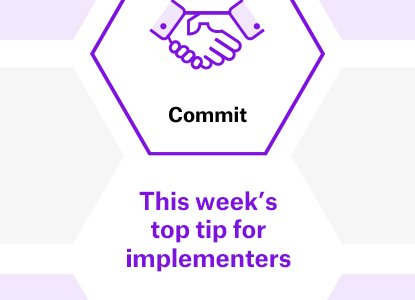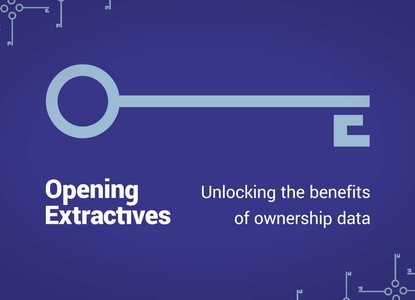Opening Extractives: Global Beneficial Ownership Transparency Implementers’ Forum

Organised by the Extractive Industries Transparency Initiative (EITI) and Open Ownership (OO), and supported by the BHP Foundation, the Opening Extractives Global Beneficial Ownership Transparency Implementers’ Forum brought together implementing countries and beneficial ownership transparency (BOT) reformers from around the world. It took place in London and virtually on 8 September 2021, and was the official launch of Opening Extractives, OO’s collaborative programme with the EITI. The Opening Extractives programme aims to transform the availability and use of beneficial ownership data to tackle corruption and mismanagement in the extractive sector.
The day began with a presentation by Mark Robinson, Executive Director of the EITI, and Louise Russell-Prywata, Director of Policy and Research at OO. They introduced the Opening Extractives programme and outlined why it is so important to both organisations, sharing Opening Extractives’ aims to unlock the potential of BOT and improve natural resources governance. James Ensor, CEO of the BHP Foundation, then spoke about how the foundation sees the Opening Extractives programme as a unique opportunity for investment.
It was announced that nine governments have confirmed their country’s participation in the Opening Extractives programme: Argentina, Ghana, Indonesia, Liberia, Mexico, Mongolia, Nigeria, Philippines, and Zambia. The Forum progressed through three virtual and in-person hybrid sessions, each focused on one of the three objectives of the Opening Extractives programme.
1. Implementing beneficial ownership transparency effectively
In this session, Opening Extractives participant governments shared their specific commitments to and progress in advancing beneficial ownership reform. Tonu Basu, Deputy Director of Thematic Policy Areas at the Open Government Partnership, moderated the session and set the scene by highlighting the value of global initiatives such as the Open Government Partnership to realising the implementation of BOT commitments. Speakers then highlighted their national priorities for working with the Opening Extractives programme to implement BOT.
Sampe Purba of the Ministry of Energy and Mineral Resources of Indonesia highlighted the strong momentum towards BOT and the challenge of harmonising the legal framework around beneficial ownership disclosure. Jemima Oware, Registrar General of Ghana, highlighted the need for inter-agency cooperation and active enforcement of disclosure requirements.
Alfonso Lanuza Jr., Section Chief for Anti-money Laundering at the Securities and Exchange Commission of the Philippines, discussed the progress already made in collecting beneficial ownership information and the role of the Opening Extractives programme in engaging stakeholders within and outside of government to develop and realise plans to publish beneficial ownership data. Jeffrey Yates, National Coordinator of Liberia EITI, shared Liberia’s ambitions to make rapid progress over the coming months to develop regulations and design software to collect and publish beneficial ownership data.
2. Driving progress towards beneficial ownership transparency internationally
This session linked the technical progress made by leading countries towards BOT to efforts to accelerate BOT on the international stage. Thom Townsend, Executive Director of OO, moderated the session and introduced the context of substantial progress and technical momentum to implement BOT. Ani Varderesyan, Expert at the Ministry of Justice of Armenia, showcased Armenia’s new Beneficial Ownership Data Standard (BODS) structured extractives disclosures and highlighted how the work to deliver transparency in one sector was critical for effectively delivering economy-wide disclosure. This is an important part of the Opening Extractives programme, ensuring the gains made by implementing extractive transparency can lead to the more effective delivery of economy-wide disclosures.
Alhaji Garba Abubakar, CEO of the Corporate Affairs Commission of Nigeria, discussed the necessity of creating cross-departmental opportunities for beneficial ownership data use, outlining the 21 departments across a range of Government of Nigeria policy areas that aim to make use of the data and integrate it with their own systems. Both Armenia and Nigeria are members of the Beneficial Ownership Leadership Group, and through the Leadership Group and the Opening Extractives programme they aim to share good practice and lessons from implementation with other countries to advance BOT around the world.
The session concluded with Maíra Martini, a leading technical expert on beneficial ownership at the Transparency International secretariat, outlining the multitude of international institutions, such as the Financial Action Task Force (FATF) and the United Nations (UN), who provide the levers to create a strong and lasting new global norm of BOT, and how evidence from leading countries can contribute to global change.
3. Using beneficial ownership data to realise its impact
The final session showcased the potential for governments, civil society, and the private sector to use beneficial ownership data to reduce corruption and improve natural resource governance. Erica Westernberg, Director of Governance Programmes with the Natural Resource Governance Institute, moderated the session and situated the discussion in the context of an increasing focus on the need to use beneficial ownership data within extractives licensing to reduce corruption risks.
Laura Ropolo, undersecretary of Mining Development for the Government of Argentina, highlighted the relevance of beneficial ownership reforms in strengthening Argentina’s systematic disclosure of extractives data and the benefits of using this data to grant mining licences in a transparent and accountable manner. Khadija Sharife, Africa Editor with the Organised Crime and Corruption Reporting Project, discussed powerful examples of journalists using beneficial ownership data to track the transnational movement of assets and “follow the money” in grand corruption cases.
Oleksandr Pomoshnikov of YouControl, Ukraine explained how his company uses beneficial ownership information to increase the transparency of the business environment and to reduce the level of corruption in Ukraine. Andres Hernandez of Transparencia por Colombia ended by sharing his organisation’s analysis of the lack of transparency of extractives companies in Colombia and how beneficial ownership data would assist civil society efforts to strengthen natural resource governance.
Looking ahead
This kind of conversation, spanning multiple countries’ experiences of implementation at a granular level of detail, simply would not have been possible even two years ago. This reflects the pace of the delivery of beneficial ownership reforms achieved by the global community in recent years. However, there is still more to be done, and the Opening Extractives programme aims to accelerate the pace of reforms in the coming years. Now is the time for significant investment; the global conversation on BOT has firmly shifted from talking about why it is necessary to how it can best be delivered.
When asked to share her hopes for what can be achieved with BOT in five years’ time, Maíra Martini said: “My hope is that in forums like this people will no longer be talking about how to best build the systems we so badly need to make BOT reform a reality, but rather how the new data is being used and how we can continually improve its quality.” OO shares this hope and believes that the Opening Extractives programme, with its increasing investment from governments and the international community, will be doing exactly that by 2026.
For further information
- Watch the Opening Extractives introductory video.
- Watch a recording of the days’ sessions.
- Read a factsheet on the Opening Extractives programme.
- Contact us if you would like to learn more.
Related articles and publications
Publication type
Event
News article
Topics
Opening Extractives

